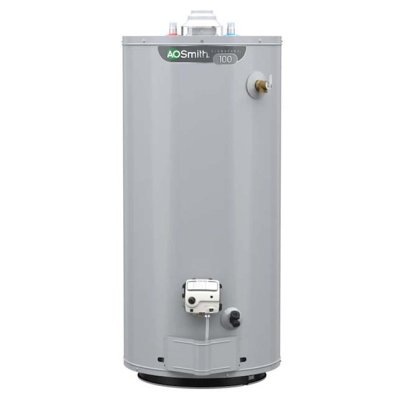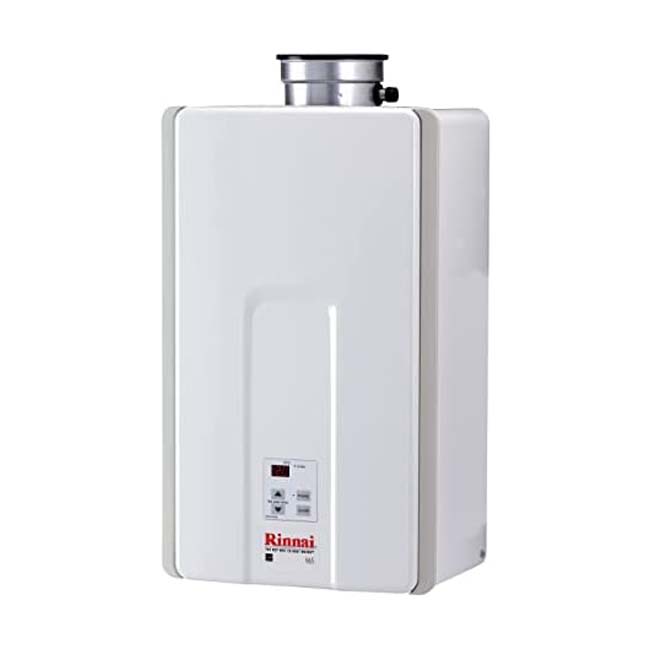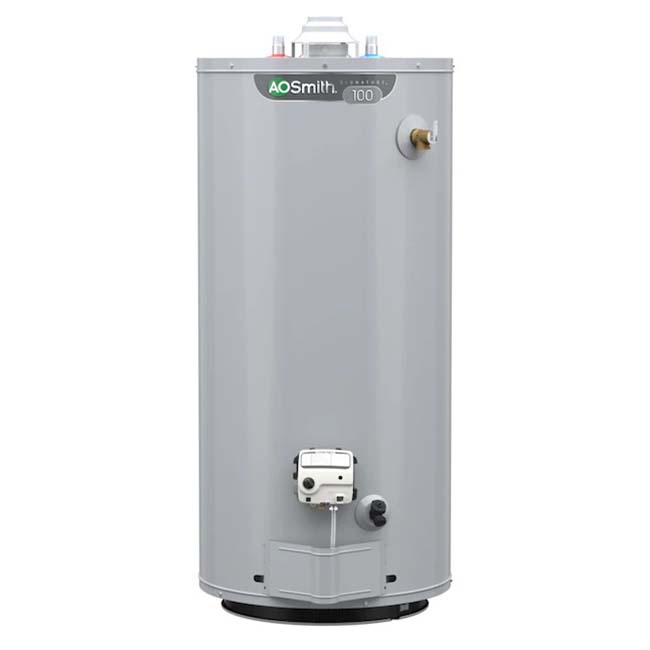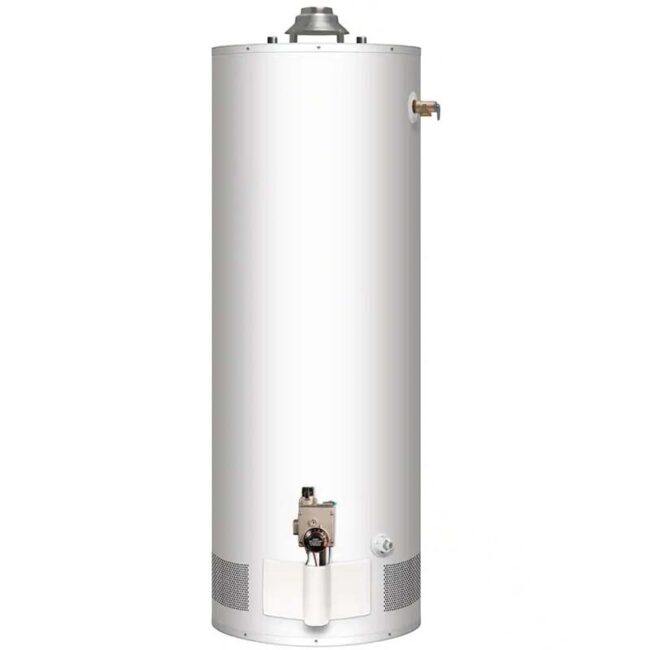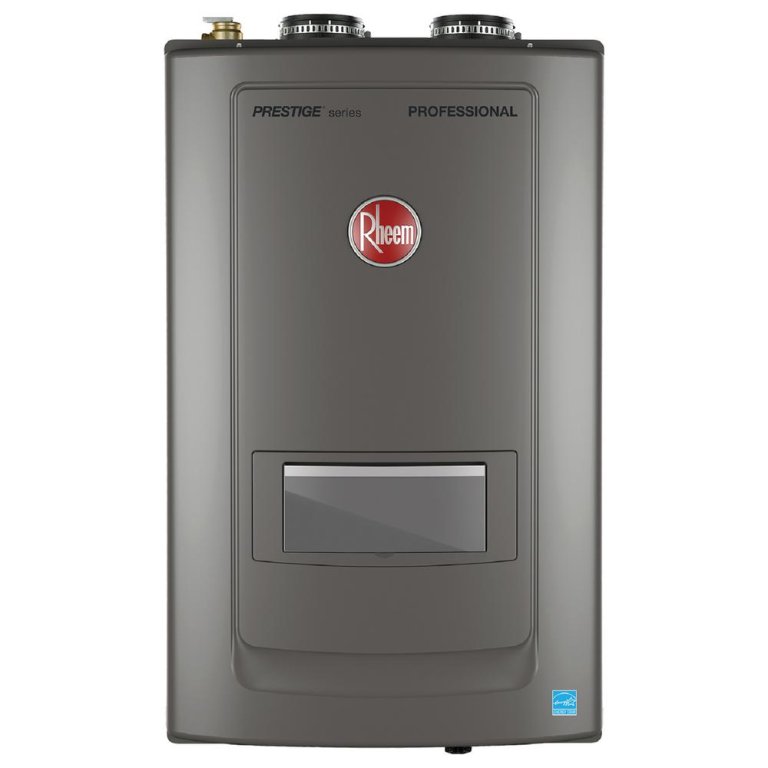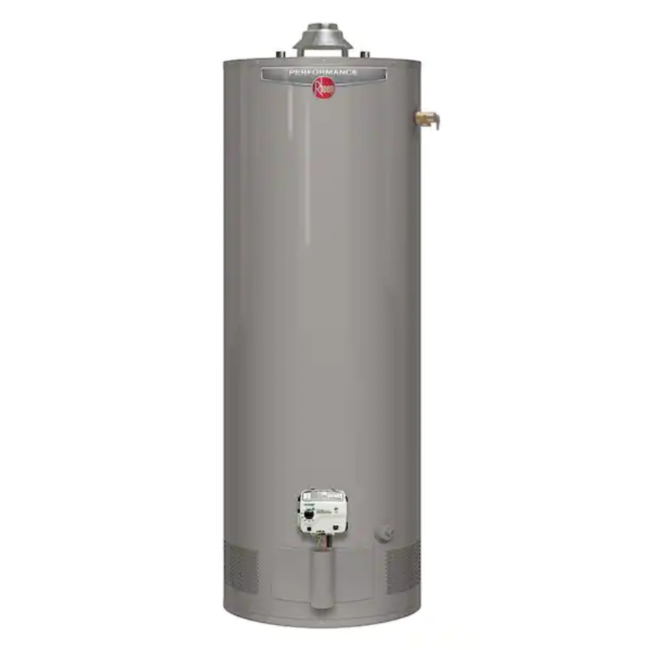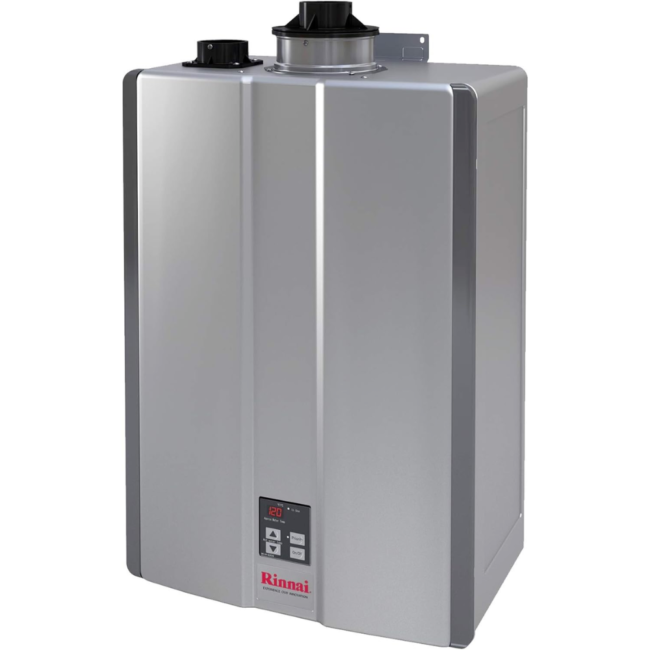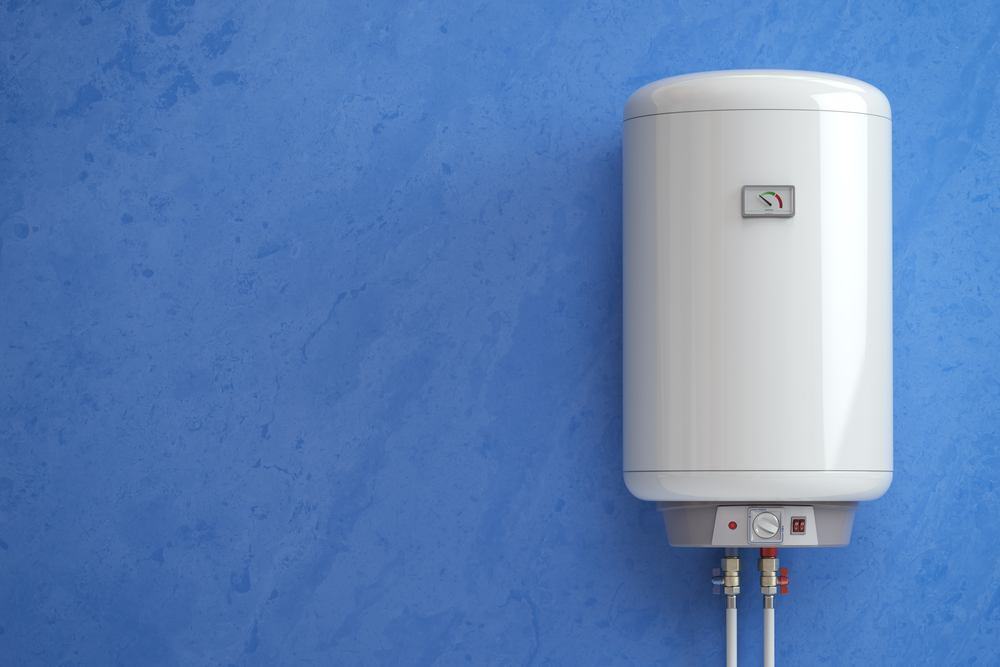
We may earn revenue from the products available on this page and participate in affiliate programs. Learn More ›
Buying a new water heater used to be easier. With only the conventional tank-style heaters available, there were few options to choose from. Nowadays, technological advances have led to the development of different types of water heaters along with various electronic components and features that can make this purchase decision more challenging.
Since a water heater can be a substantial investment, it’s important that it lasts for years to come. Read on to learn what factors to consider when looking for a new water heater, to see some of the highest-rated products spanning several different categories, and to discover how to find the best gas water heater for the home.
- BEST OVERALL: Rinnai V65iN High Efficiency Tankless Water Heater
- RUNNER-UP: A.O. Smith 40-Gallon Natural Gas Water Heater
- BEST BANG FOR THE BUCK: Sure Comfort 40-Gallon Natural Gas Tank Water Heater
- BEST TANKLESS: Rinnai RL75IN High Efficiency Tankless Water Heater
- BEST COMBINATION: Rheem Prestige High Efficiency Combination Boiler
- BEST 50-GALLON: Rheem Performance 50-Gallon Tank Water Heater
- BEST ENERGY EFFICIENT: Rinnai RU160iN Super High Efficiency Water Heater
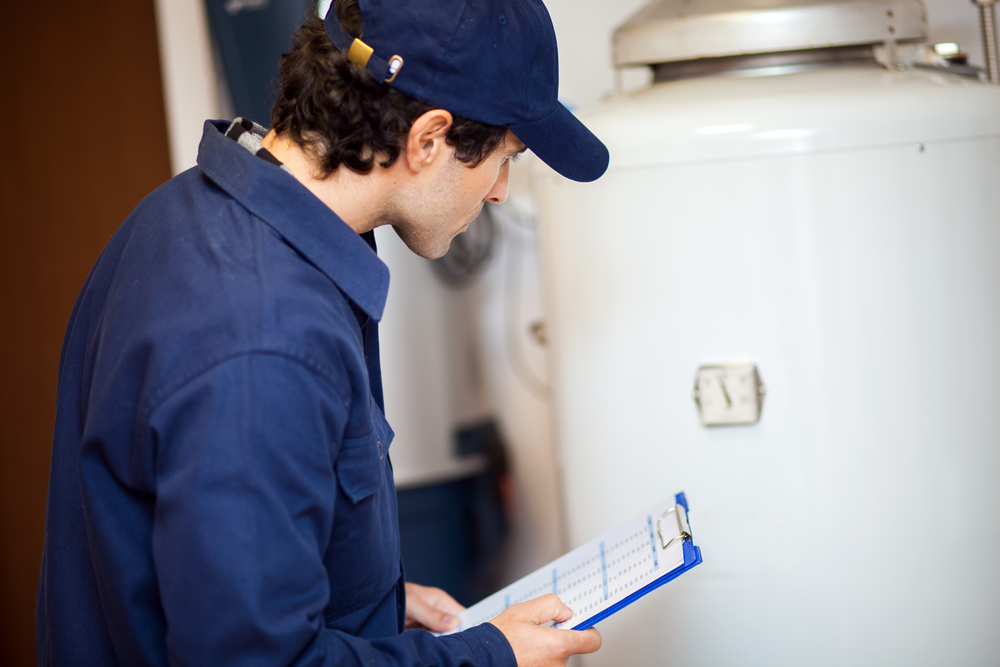
How We Chose the Best Gas Water Heaters
Selecting the top water heaters for this list began with extensive research into a broad pool of products to find the best options available based on key efficiency, size, and performance factors. Finding the right water heater can make the difference between a warm, relaxing shower or an abrupt awakening as cold water suddenly bursts from the shower head. With that in mind, size and capacity played a major role in determining the top options for this list.
To bolster our research, we reached out to Roy Barnes, co-owner of Service Force Plumbing based in Rockville, Maryland, who gave us his expert advice. He says the main advantage of a gas water heater compared with an electric one is “simply that recovery is faster.” He goes on to say, “If you have multiple people taking hot showers or other reasons for continuous hot water use, a gas water heater is able to transfer heat to more surface area inside the tank and therefore be able to serve hot water again more quickly.”
However, even if the water is nice and warm, it can be difficult to de-stress if bills are on the mind, so operational efficiency was also a key consideration during the selection process. Products with high efficiency, durable construction, and appropriate size or output capacity for an average household tended to stand out from units that were too small, large, or costly.
Barnes also adds that one thing users should do to maintain their gas water heater is to flush it regularly. “Over time, debris from your water source builds up in the water heater, and this ‘steals’ heat from the water, meaning it takes more time and more gas to heat the same amount of water. So your recovery rate may be affected, and your gas bill may be higher.” With this in mind, we made sure that our list of recommendations includes models that are simple to flush for most homeowners.
Our Top Picks
The top options below were selected based on installation difficulty, maintenance requirements, energy-efficiency ratings, size, and capacity. Each of our top picks was thoroughly vetted, organized by category, and comes with a list of pros and cons.
Best Overall
Rinnai V65iN High Efficiency Tankless Water Heater
See ItPros
- The high-efficiency operation can reduce costly household energy bills
- Replacing a tank-style heater with this tankless heater increases floor space in the home
- At a flow-rate capacity of 6.5 GPM, this heater is suited for a 4-person household
- Users get on-demand hot water that won’t run out in the middle of a shower
Cons
- Installation of this unit will typically require new water and gas supply connections
Product Specs
- Type: Tankless
- Capacity: 6.5 GPM (gallons per minute)
- EF rating: 0.82
One of the main disadvantages of many tankless water heaters is the cost of the unit, but Rinnai’s tankless unit is a powerful water heater at an affordable price. This tankless unit boasts an EF rating of 0.82 but still generates enough power to produce a 6.5-GPM flow rate that brings continuous hot water to a four-person household. Although it will still be more expensive to install than a conventional storage tank heater, its compact size offers a wider range of location options, and it won’t take up precious floor space in the home.
Get the Rinnai V65iN gas water heater at Amazon, The Home Depot, or Wayfair.
Runner-Up
A.O. Smith 40-Gallon Natural Gas Water Heater
See ItPros
- The 40-gallon tank is well-suited for homes with 3 or 4 people
- 40,000-BTU burner provides powerful heating capabilities to warm the tank contents rapidly
- Users can get as much as 67 gallons in the first hour of operation
- Electronic gas valve ensures precise temperature control for optimal user comfort
Cons
- Relatively low efficiency rating may indicate an increase in energy bills with this unit
Product Specs
- Type: Storage tank
- Capacity: 40 gallons
- EF rating: 0.58
A.O. Smith’s 40-gallon gas water heater offers features similar to more expensive units but at a fraction of the price. It features a 40,000-BTU burner that can satisfy the hot water demands of a three- to four-person household and can deliver as much as 67 gallons in the first hour to avoid the hassle of running out of hot water when demand is high. It’s also equipped with an LED display for diagnostic reporting, push-button ignition, an electronic gas valve for precise temperature regulation, and safety features that prevent accidental fires from vapor ignition.
Get the A.O. Smith gas water heater at Lowe’s.
Best Bang For The Buck
Sure Comfort 40-Gallon Natural Gas Tank Water Heater
See ItPros
- Modest 40-gallon tank is a good option for homes with 2 to 4 people
- Wait time for hot water is short, with 67 gallons of hot water in the first hour
- Tall, slim design reduces the amount of floor space required for installation
Cons
- This unit is not a high-efficiency option, so operation could increase energy bills
Product Specs
- Type: Storage tank
- Capacity: 40 gallons
- EF rating: 0.59
For an affordable water heater that doesn’t compromise on functionality, this 40-gallon gas water heater from Sure Comfort might be all that is needed to replace the water heater affordably. Although it’s not the most powerful unit on the list, the 34,000-BTU burner is plenty for a household of two to four people and delivers 67 gallons of hot water in the first hour of operation. Its tall and sleek design is made to make installation easier, which may even reduce the cost of installation.
Get the Sure Comfort gas water heater at The Home Depot or Menards.
Best Tankless
Rinnai RL75IN High Efficiency Tankless Water Heater
See ItPros
- Comes with an Energy Star certification; uses 40 percent less energy than tank water heaters
- Compact compared with similar options available; should be easy to install and won’t take up space
- Emits over 10,300 to 180,000 BTUs of heat for effective, long-term use
Cons
- Slightly more expensive than some comparable options available
- Flow rate is not as high as that of other models on the market
Product Specs
- Type: Tankless
- Capacity: 7.5 GPM
- EF Rating: 0.81
Built with an Energy Star certification, 0.81 EF rating, and a maximum flow rate of 7.5 GPM, this Rinnai RL75IN tankless water heater is an efficient option. This compact, non-condensing water heater is the size of a small piece of luggage, which makes it easy to install indoors, yet it provides a powerful output of 10,300 to 180,000 BTUs. Since this 45.6-pound natural gas model is tankless, it uses 40 percent less energy than tank water heaters. Users can also add Wi-Fi compatibility to this model for quick adjustments and checks.
Get the Rinnai RL75IN gas water heater at Amazon, Lowe’s (vent termination kit included), or The Home Depot.
Best Combination
Rheem Prestige High Efficiency Combination Boiler
See ItPros
- Impressive flow rate of 9.9 GPM is more than enough for the average household
- At an EF of 0.95, this unit boasts one of the highest efficiency ratings available
- Includes a room air-intake vent to help reduce installation costs
Cons
- Complex installation procedure requires the services of a professional installer
- Not a practical investment for homes that already have a furnace
Product Specs
- Type: Combination
- Capacity: 9.9 GPM
- EF rating: 0.95
For those tired of wasting money to power a central heating boiler and water heater, a combination water heater may be an attractive option. This combi boiler from Rheem boasts a 9.9 GPM output capacity that can satisfy the hot-water demands of a home with up to 2.5 bathrooms while using the least amount of energy possible—an AFUE rating of 95 percent. It also features a room air-intake vent to eliminate the need to install an intake vent to the outside, and the exhaust vents are compatible with PVC to further reduce installation expenses.
Get the Rheem combination gas water heater at The Home Depot, ABR Wholesalers, or Wholesale Water Heaters.
Best 50-Gallon
Rheem Performance 50-Gallon Tank Water Heater
See ItPros
- 38,000-BTU burner can heat an 85-gallon water supply in the first hour
- Tall 50-gallon tank provides enough water for a 4- or 5-person home
- Narrow size reduces the space required for the installation of this unit
Cons
- Moderate 0.63 efficiency rating isn’t overly helpful in reducing energy costs throughout the year
Product Specs
- Type: Storage tank
- Capacity: 50 gallons
- EF rating: 0.63
For a no-frills storage hot water tank that offers enough power and storage capacity for a three- to five-person household, Rheem’s 50-gallon gas water heater might be just what’s needed. It features a 38,000-BTU burner that can deliver an impressive 85 gallons of hot water in the first hour. The tank’s narrow profile was designed for ease of installation in a variety of indoor spaces, so the unit’s affordable price point is complemented by a potentially reduced installation cost. However, its EF rating of 0.63 won’t save as much money on the utility bill as other more efficient units.
Get the Rheem Performance gas water heater at The Home Depot.
Best Energy Efficient
Rinnai RU160iN Super High Efficiency Water Heater
See ItPros
- An energy-efficient model with an EF rating of 0.95, among the highest on this list
- High water output of over 9 GPM with powerful 15,000 to 160,000 BTUs of heat output
- Built-in temperature-lock function prevents accidental changes to water temperature
Cons
- Low heating capacity compared with some options available
- Should be installed by a professional; larger than some other options available
Product Specs
- Type: Tankless
- Capacity: 9 GPM
- EF rating: 0.95
Those who need a sufficient supply of hot water without breaking the bank on energy bills will want to consider the Rinnai RU16iN Super High Efficiency water heater. This model comes with an efficiency rating of 0.95, making it one of the most energy-efficient models on our list. This condensing water heater also provides effective use as it provides a flow rate of 9 GPM at 15,000 to 160,000 BTUs. It also comes with a built-in temperature-lock function. Plus, since it is tankless, it uses 40 percent less energy than traditional tank models.
At 72.5 pounds, this indoor water heater is best installed by a professional. It also has Wi-Fi connectivity (sold separately) for easy adjusting and monitoring.
Get the Rinnai RU160iN gas water heater at Amazon or The Home Depot.
Jump to Our Top Picks
What to Consider When Choosing a Gas Water Heater
Opting for gas water heaters over electric water heaters somewhat narrows the search, but there are still several other factors to consider when selecting the perfect one for the home. There are different types of gas water heaters with different installation and maintenance requirements, energy-efficiency ratings, storage capacities, and safety considerations. Take the following considerations into account when looking for the best water heater to meet the specific needs of a home.
Type
There are three primary types of residential gas water heaters: storage tank, tankless, and combination units.
Storage-tank water heaters are the most common type. Tank water heaters consist of an insulated tank that uses a flame burner to warm the water stored inside and a thermostat that regulates the temperature of the water in the tank. Typical tank sizes include 40-gallon and 50-gallon tanks, though there are both smaller and larger tanks available. The heated water stored in the tank supplies all the hot water to the faucets and appliances. The primary disadvantage of tank water heaters is that it takes time for the tank to refill and reheat after the hot water in the tank is depleted from use, like after a long shower, so don’t expect to have hot water for the first hour. Water heater blankets can help insulate the tank, reduce heat loss, and increase the efficiency rating.
Tankless water heaters don’t store a large reservoir of hot water but use a compact boiler that heats water only when hot water is needed. Also called on-demand water heaters, they are similar to running a hot water faucet or shower valve, which makes them significantly more energy efficient. Since they don’t rely on preheating and storing a large reservoir of water, the risk of running out of hot water is less than with a storage tank heater. However, a tankless water heater might not keep up with an excessive demand for hot water if it doesn’t have sufficient output capacity. The other disadvantage of tankless systems is that they’re more expensive to purchase and install.
Combination water heaters, sometimes called combi boilers, combine a water heater and a central heating boiler into a single high-energy-efficient unit. They use energy to heat a single unit that’s responsible for both the home’s heating and hot water instead of requiring energy to fuel two separate appliances. The primary disadvantage of these units is that they’re incredibly expensive to purchase and install and are only practical for homes that are heated with an existing boiler, not a furnace. Although they’re rarely seen in American residences, they’re popular in the United Kingdom, where they account for more than half the boilers installed in newly constructed residences. In the United States, they’re most often used in small apartment complexes.
Size and Capacity
The water-storage capacity of tankless and combination water heaters can range from 20 to 100 gallons, with the most common options being 40-gallon gas water heaters and 50-gallon gas water heaters. The general rule of thumb for determining hot water needs is to add 10 gallons for each person in the household. A 40- to 50-gallon gas water heater tank should be plenty for a four-person home.
A tankless water heater’s capacity is determined by the flow rate in GPM. A home’s needed flow rate for a tankless water heater depends on the number of people in the household and the flow rate required by each of the hot water fixtures, including the kitchen sink, bathroom sinks, shower, and tub. Each fixture requires a certain flow rate for optimal operation, and more people in the home means there is a higher likelihood that more than one fixture will be running simultaneously. Generally speaking, a household with fewer than four adults needs a tankless water heater with a flow rate of between 3 and 5 GPM, while a household with more than four adults may need a heater with a flow rate between 6 and 10 GPM.
Combination boilers will have different sizes and capacities depending on the size of the existing boiler that will be replaced. Therefore, it’s best to consult a professional installer when determining the size and capacity of the combi boiler.
Direct-Fired vs. Indirect-Fired
Storage-tank water heaters can heat water through either a direct-fired or indirect-fired process. Direct-fired heaters have their own burner that heats the water in the tank directly. They have an open-flame burner integrated into the tank, so exhaust needs to be released through ventilation lines to the outside. Direct-fired heaters are the most common type since they’re typically more affordable, energy efficient, and can be installed in any home.
Indirect-fired heaters use a boiler that’s separate from the storage tank. Heat transfer coils act as a heat exchanger to transfer the heat from a separate boiler, typically the boiler used for the home’s central heating, to the water in the storage tank. Depending on the distance between the water tank and the boiler, they may be less energy efficient. However, they require less maintenance since they don’t have a burner that can experience mechanical defects or gas and ventilation lines that need to be periodically serviced.
They also can be potentially more energy efficient than direct-fired heaters since they passively utilize the heat generated from a boiler or furnace already running to heat the home. Indirect-fired heaters can only be installed in homes already equipped with compatible boilers and don’t require any ventilation since no combustion occurs at the tank.
Energy Efficiency
The energy efficiency of a water heater refers to the amount of energy that is actually used to heat the water. This is an important factor to consider since water heaters are the third most energy-demanding appliance in most homes and can account for as much as a quarter of the monthly utility bill.
Every new water heater comes with an EF efficiency rating that indicates the percentage of heat energy that’s used to heat the water. The EF factor is expressed as a ratio instead of a percentage, but an EF rating of 0.7 means that it converts 70 percent of the energy used into heat. Combination water heaters use the AFUE rating, which expresses energy efficiency as a percentage and is the rating standard used for boilers.
Although gas water heaters are less efficient than electric water heaters, gas is usually considerably cheaper than electricity, which will likely translate to a reduced overall operating cost. Regardless of fuel source, tankless water heaters are much more efficient than storage tank peers and can reduce the monthly energy bill by up to 40 percent.
Safety
Water heaters are generally safe to use, but there are still some important safety considerations to keep in mind. Direct-fired water heaters require proper ventilation to allow the toxic and flammable exhaust gasses to escape to the outdoors.
Proper temperature regulation of the water inside the tank is also important to avoid the water getting too hot or too cold. Water temperatures that are too high, above 140 degrees Fahrenheit, can cause scalding burns on people exposed to the hot water. Water temperatures that are too low, below 120 degrees Fahrenheit, can cause bacterial growth and an increased risk of contracting Legionnaires’ disease.
Water temperatures inside a water tank in excess of 212 degrees Fahrenheit can turn into steam, which will increase the pressure in the water tank and possibly cause an explosion. Fortunately, water heaters have temperature and pressure relief (T&P) valves to prevent this from happening by automatically relieving the tank’s internal pressure when a high enough pressure is reached.
Inexperienced DIYers should never attempt to relieve the T&P valve manually by themselves but should contact a professional plumber if they are concerned about the water heater’s temperature or pressure levels.
Installation
Installing either gas or electric water heaters can be an expensive and labor-intensive task that requires a considerable knowledge base and skill set. As a result, it’s not a task that should be attempted as a DIY project but should be done by a professional plumber.
Installing a tankless water heater without prior experience is especially discouraged since new natural-gas and water-supply lines often need to be installed. Installing a combination water heater is also a highly complicated procedure that should be reserved for professionals. Depending on location, the cost of installing a storage tank water heater can range from $800 to $1,300; installing a tankless water heater usually costs between $1,000 and $3,500; and the cost of installing a combination water heater can be between $3,500 and $8,000.
Maintenance
Unlike installation, a water heater can be easily maintained by the average DIYer. Regardless of the type of water heater, the primary maintenance consideration is the removal of mineral and sediment buildup. Mineral deposits will accumulate in the storage tank over time, causing corrosion that can reduce the energy efficiency and lifespan of the heater.
For storage-tank heaters, it’s recommended to flush the tank every 2 years. This is done by shutting off the gas and water supply to the tank, attaching a hose to the drain valve at the bottom of the tank, running the hose outside, and then opening the tank’s drain valve until it’s completely flushed. Take care to position the hose correctly and ensure there are no leaks, otherwise there may be gallons of hot water pouring into the home.
Tankless water heaters need to be flushed more often, usually once or twice a year since mineral deposits tend to accumulate more rapidly. Most tankless heaters have purge valves accessible under the tank’s lid to accommodate a hose attachment so it can be flushed like a storage-tank heater. Simply shut off the water supply and propane or natural gas, then connect the hose, run the hose outside, and open the purge valves. It’s also recommended to rinse the heat exchanger with vinegar to remove accumulated mineral deposits from the coils.
FAQs
There’s a lot of information to digest when you’re considering a new water heater, so you may still have some questions about propane, natural gas, or even electric water heaters. Consider the following answers to some of the most frequently asked questions below to help satisfy your curiosity.
Installing a tankless water heater instead of a 40- or 50-gallon tank seems like an obvious choice. However, cost is the main disadvantage of tankless water heaters since the units are typically more expensive to purchase, and they’re also more expensive to install. Additionally, a small tankless water heater may not be able to keep up with the demands of a home that previously used a 60- or 80-gallon gas water heater, so it’s important to keep the capacity of the water heater in mind before purchase.
If you purchased a gas water heater with a sufficient capacity to satisfy your home’s hot-water demands, it should easily be able to keep the water warm in your entire house.
Unless you’re an experienced plumber, it’s generally recommended to hire a professional to install your new water heater.
Gas water heaters can last between 8 and 20 years.

